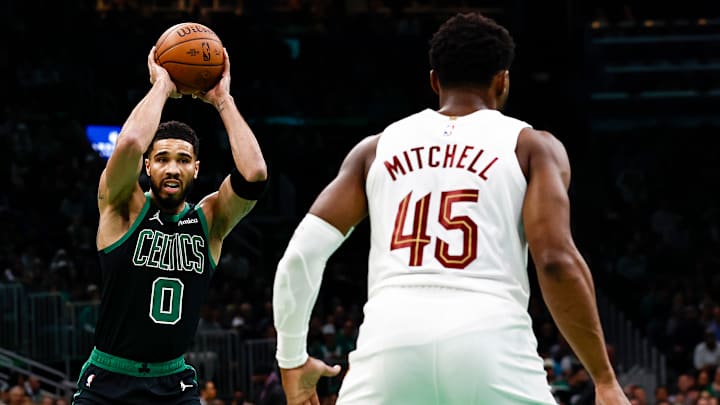The Cleveland Cavaliers wanted to prove that they were in Boston's class as true contenders.
They did that and more on Tuesday night, heading into Boston Garden for an NBA Cup showdown between the 15-0 Cavaliers and the defending champions. It was an historic night and a titanic matchup between the top two teams in the Eastern Conference - and the game itself did not disappoint. The Celtics opened up a massive lead before the Cavaliers marched back, closing to within one possession multiple times.
Ultimately, the Celtics were too much, and they came away with the 120-117 victory. The Cavaliers got 35 from Donovan Mitchell and largely controlled the paint, but it wasn't enough to win.
The reason? They lost the math equation.
The Celtics won the math game with their shooting
The Cleveland Cavaliers came into their monumental showdown with the Boston Celtics Tuesday night as the league's No. 1 offense, a full point ahead of the No. 2 Celtics. Their 63.9 true-shooting percentage led the league by a country mile, as they were the most accurate team in the league from both 3-point range and on 2-pointers.
That included a 41.9 percent mark from 3-point range, well ahead of second-place Golden State at 39 percent, and well ahead of the 11th-place Boston Celtics at 37 percent. Yet where the Celtics held the advantage over the Cavaliers and the rest of the league heading into the game was in 3-point volume; Boston's 51.3 attempts per game were 5.5 shots ahead of second-place Charlotte, and well ahead of Cleveland's 36.8 nightly attempts.
That's why the Cavaliers shot significantly better than the Celtics through the first month of the season but still lagged well behind in 3-point makes, 15.4 to Boston's 19 made 3-pointers per game. Before the ball was even tipped to start the game, the Cavaliers were at a math disadvantage to the Celtics.
That high volume of shots also meant that on a night when the Celtics caught fire, they would be uncatchable because of the sheer number of 3-pointers raining down on the Cavs' heads. The Celtics took 23 3-pointers in the first half and made 15 of them, a scorching 65.2 percent. The Celtics made more triples than the Cavaliers even attempted, as Cleveland went just 4-for-14 from deep in the first half. Add it up and you have a 17-point halftime deficit.
Even as Sam Merrill and Craig Porter Jr. got going for Cleveland in the second half, that was merely enough to match the Celtics, not close the gap. Instead, the Cavaliers had to dig deep from 2-point range, playing physical, cleaning the glass and finishing against tough defense inside the arc.
It worked for a while, as the Cavs closed the margin to a one-score game, because the Celtics put the game out of reach in the closing second and came away with the win. The final numbers? Cleveland finished the night 10-for-29 from deep, while the Celtics scorched the nets to the tune of 22-for-41. That amounted to a +36 advantage from long range, too much for the Cavs to overcome.
The Celtics won the math game with their depth
The 15-0 Cleveland Cavaliers went into a road game with the defending champions on an NBA Cup night and started the 6'4" Sam Merrill at small forward, matching him up with Jaylen Brown. They gave significant minutes to Craig Porter Jr. Despite his defensive deficiencies, the Cavaliers had to give Georges Niang all of the backup frontcourt minutes and largely closed with him at the 4, providing a soft spot for the Celtics to continue to attack.
Merrill and Niang have a spot in the full-strength rotation, but in much smaller roles better suited for their skillsets. Porter Jr. is an excellent third point guard. Yet they had to all step into roles too big for them against the best team in the Eastern Conference because the Cavaliers entered the game missing a number of key players.
In addition to the injured Max Strus, the usual starter at small forward who has missed the entire start to the season, the Cavaliers were devastated throughout their usual rotation. Caris LeVert has been a revelation thus far this season, among the league's plus-minus leaders, and he missed the game nursing a knee injury. Isaac Okoro had been starting at the 3 in Strus's absence and missed the game. Dean Wade, a capable starter and the two-way combo forward that Cleveland relies on in the frontcourt, missed Tuesday's game and will miss the next few.
That's four of the team's top 9 players all missing the game, including every wing defender that Cleveland has. They thrive because of their ability to play a variety of lineup combinations, but that ability was taken away from head coach Kenny Atkinson. He was also without any answers at small forward against the team with two Top-30 players at the position. The Cavs never had a chance.
Boston was playing without Kristaps Porzingis, to be fair, but otherwise had their rotation healthy and accounted for. They had more reliable rotation players at the most important positions, and the Cavaliers simply couldn't keep pace.
The Cavaliers proved they belonged, they battled despite being short-handed and they very nearly came back and won. Yet if the Cavaliers want to win a playoff rematch come May, they need to find a way to improve their math.
